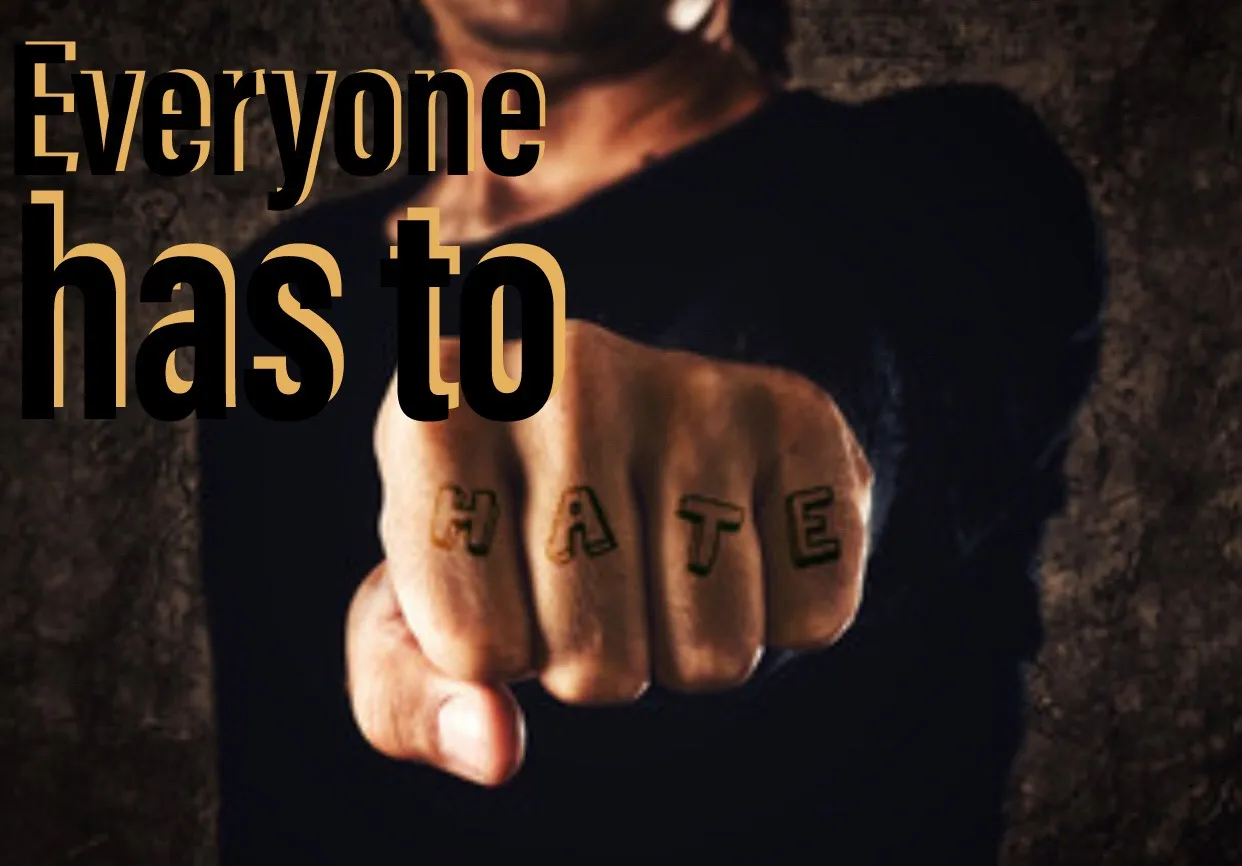I’m starting to get used to it, this unexpected super power I’ve been taking for granted. We’ve been in England going on two months now, the sound of my American “accent” brings an instant feeling of delight and calmness to an otherwise unnatural, tension infused feeling regardless of who I exchange dialogue with—Arab or English. I put accent in “quotations” because they tell me I have an accent, “I can tell you’re not from here” they say. I sound different to them but, to me, they all sound the same, they all have the exact same British accent—Arab and English.

someone.
Having just spent six months in Costa Rica where my voice made me a martyr, it’s nice being somewhere I’m heard as quite the contrary. I’m not kidding, there’s such a social divide here in England between Muslims and Christians, all it takes is the sound of a non-British accented voice, and the surrounding attitudes instantly transform from intense to inviting. With one word, I can cut tension and visibly see a smile in their eyes—hello. “Hello” to the cab driver, waitress, laundry attendant, store clerk, whomever, and you can feel the mood relax as they suddenly feel compelled to initiate a friendly conversation with me, “where ya from? How long you been here?” To understand the divide I’m talking about, we have to go back 70 years to 1948.
At the end of World War 2, in 1945, The Royal Commission of Britain realized in order to keep up with the textile industry in a post-war, new, and booming industrial economy in England, a large influx of immigrant labor was necessary. Within three years they developed the British Nationality Act 1948 which entitled all Commonwealth citizens free entry into Britain, the majority of whom came from India prior to the split between now Bangladesh and Pakistan—a primarily Muslim community.
70 years later, as we approach 2020, there’s a third generation of naturalized population beginning in Britain. Everyone who’s about my age in the UK today and younger, regardless of immigration origin, was born and raised in the UK and calls it home—it is their home. But because of a generation who continues to oppose legislation set back in the 40’s, tension and animosity continue to escalate. Since arriving in England two months ago I’ve been made aware of riots and the hate crimes of today. Regardless of the person’s clothing attire I sit next to on public transportation, wether it’s a garment that covers their knees and a taqiyah or a tank top and a Yankees hat, until I speak, there’s a tension in the air you can feel—like the weather.
As soon as I talk, though, all I have to do is use my super power and something as simple as “hello,” it’s as though the sound of my voice immediately disarms their internal alert system. With walls down, a relaxed guard and a new profound wide-eyed energy, the tension in the air is released by the sound of my voice as though my west coast, North American “accent” is commonly understood as neutral to their:

BS.
It’s addicting—true story! It’s a really convenient power to have actually—the ability to enhance positive energy. Just the other day, a gentleman stepped out of his vehicle and was locking his car door as Pura and I walked passed him on the sidewalk. As we stepped around him and made eye contact, I acknowledged him with “good morning” and that’s all it took—we didn’t make it much farther. We found ourselves engulfed in conversation with the gentleman where we learned a little bit about his family and how long he’s resided in England and, within a few minutes, he called his grandson on the phone, pointed down the street toward an automotive garage while the phone rang saying “that’s my shop, he’s down there.” A few minutes later enters this guy’s 16 year old grandson he just wanted to introduce us to. “Hello, nice to meet you.” You could tell the young man was slightly embarrassed or confused by his grandfathers actions but, nonetheless, we all shook hands, introduced ourselves and exchanged quick conversation before parting ways.
The man in the above paragraph is Muslim. He was five years old when his father brought him and his five brothers to England on an open invite in 1955 where he wouldn’t be joined by his mother and three sisters for eight more years, could you imagine?! He’s since generated his own income, has a thriving family business, had children of his own and is currently enjoying introducing his grandson to complete strangers. Would he have stopped us that day if my “good morning” was heard with a British accent? Absolutely not, know how I know? Because he wouldn’t have the opportunity—people who don’t dress the same, have different skin color, and pray to a different God around here don’t say good morning to each other. They don’t say anything to each other, in fact, the racists who share my skin color here are so comfortable expressing their ignorance in front of me, I’ve heard extremely hateful things directed toward the Muslim community.

practice.
The other day we were on a train en route to Manchester. It was Pura and myself sitting next to each other at a table. Directly across the table from us is a woman in her thirties, with her young daughter and across the aisle is another family—a gentleman who’s probably 50 accompanied by his wife and two teenage sons. Everyone was silent, nobody said a wOrd to each other as the train doors closed and the train took off. That’s how it is around here, with three generations of tension in the air, nobody will initiate conversation. Pura said to the woman across from us, “this train’s going to Manchester, right?” That’s all it took and, just like the previous gentleman on the sidewalk, we’re now engulfed in conversation. Both she and the family across the aisle heard Pura’s non-British, English speaking voice and the atmosphere around us was immediately transformed from an awkward silence to curiosity and genuine smiles. The lady assured us we were on the correct train.
With that, the gentleman across the aisle said “sounds like you’re a long way from home.” “Can you tell?” Pura answered. Everyone seemed real friendly, even the lady across from us, “what brings you to England?” He asked. She quickly explained our purpose here and everyone engaged in small talk for a moment when he asked her “where are you guys staying?” She told him we’ve been in Bradford for three weeks and are moving to the east coast for our next month. “Bradord?!” He asked as his boys and the woman across from us all shared the same smiling facial expression, “what are you staying in Bradford for?” He continued, “the only thing Bradford’s good for is curry and terrorists.” I couldn’t believe he said that—I still can’t believe he said it.
My initial reaction was to turn my head in disgust and completely disengage myself from the conversation, which I did, Pura immediately followed while his wife, his two boys, the lady across from us and her daughter all acknowledged him by exchanging laughter. I probably should’ve said something—I continue to play that moment back in my mind and wish I would’ve said something rather than pretend I didn’t hear anything. I could’ve said “well, I love Mediterranean food and, considering I’m from the US, home of the CIA, terrorism is second nature to me” but I didn’t. I instead chose to ignore the comment by turning my back to the gentleman and stopped acknowledging the people around me—I didn’t feel like feeding into anyone’s ignorance that day.

is effortless.
What’s wrong with this place, this round or flattened surface we’re all occupying aimlessly and in unison? I say or because nobody really knows and I want to assure both my round and flat earth followers I’m not here to judge them. You don’t know anything more than me, your neighbor, the president or prime minister, the racist across the aisle from me or the people in Bradford stirring up that curry and, vice versa, none of us know as much as you. We’re all in this together but, for some unexplained reason, we’re surrounded by similar, oxygen breathing human beings who believe they’re anything but similar. They believe they’re superior and possess the right to judge—it’s disturbing.
But having a super power isn’t—it’s satisfying! With one wOrd I receive instant gratification and, regardless how the person who hears me is dressed; jeans and a t-shirt, serwal’s, a hijab or a dress, a pair of coveralls, a bisht or a sun visor, it doesn’t matter, their mood and outward attitude is noticeably enhanced by the sound of my voice—“hello.”
I often think back to that train ride and wish I would’ve addressed that guy differently who said curry and terrorists, I still can’t believe he said that. But I quickly move passed that thought because I have another one with more substance—the one where I live in a world free from division and everyone just wants to introduce me to their grandson.



